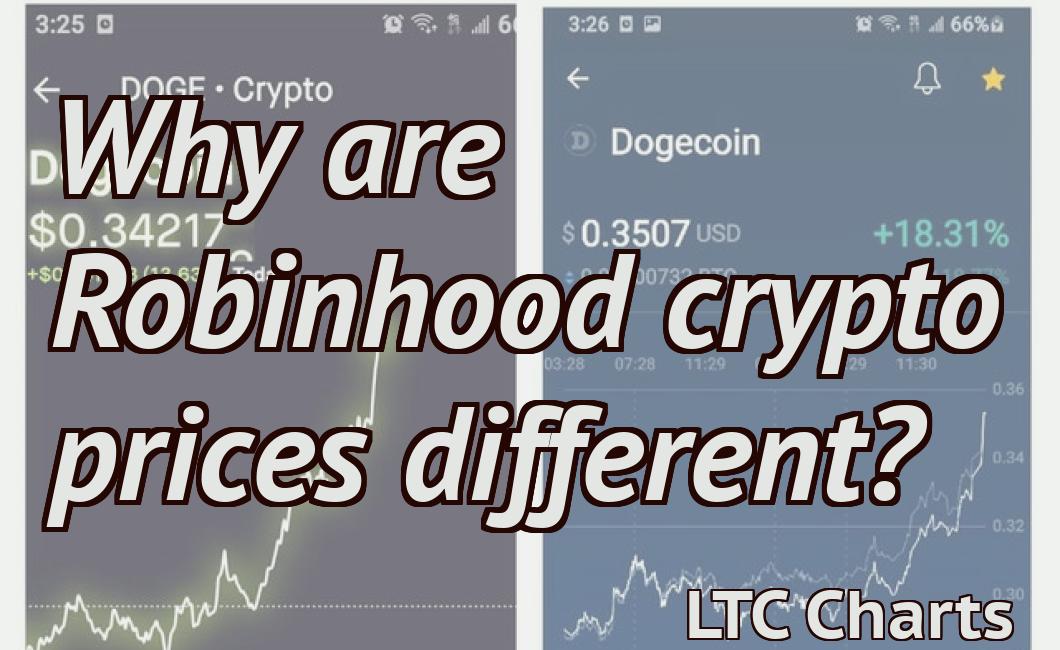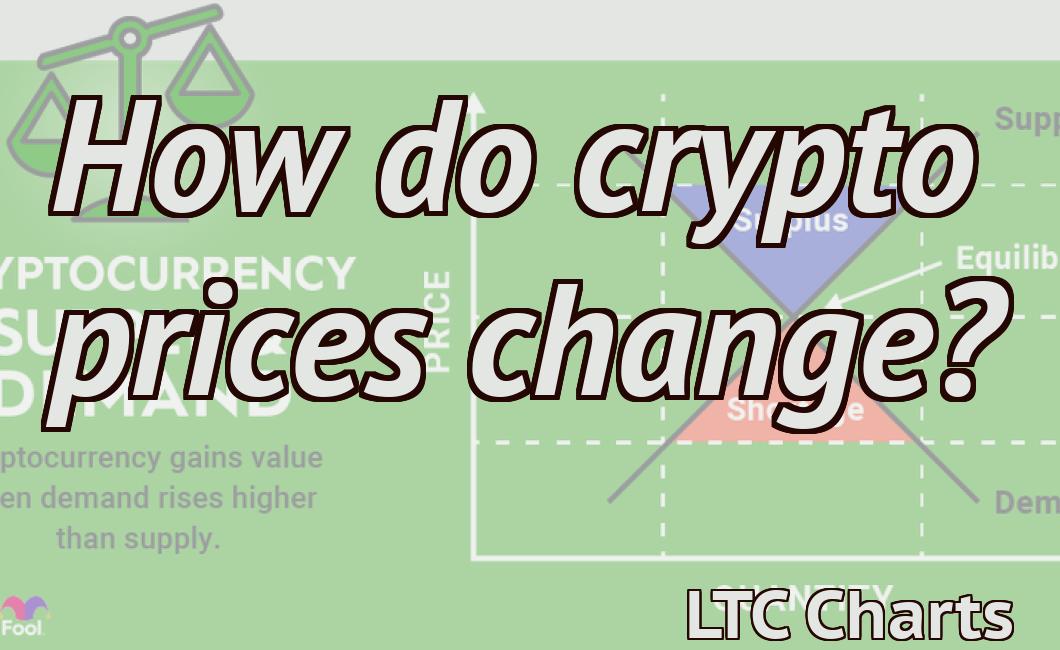Why are crypto prices different?
The prices of cryptocurrencies can differ based on a number of factors, including the exchanges they are traded on, the currency pairs that are being traded, and global market conditions.
Why Crypto Prices are Different: A Look at the Data
Cryptocurrencies are built on the blockchain technology. Bitcoin, Litecoin, Ethereum, and other cryptocurrencies are all built on blockchain technology.
Cryptocurrencies are traded on exchanges. When you buy or sell a cryptocurrency, you are trading it on an exchange.
Cryptocurrencies are not backed by anything physical. Cryptocurrencies are not backed by gold or silver. Cryptocurrencies are not backed by anything.
Cryptocurrencies are traded on exchanges. When you buy or sell a cryptocurrency, you are trading it on an exchange.
Why Bitcoin Prices are Different Across Exchanges
Bitcoin prices are different across exchanges because of the different ways in which exchanges buy and sell bitcoins. Some exchanges, like Bitfinex and GDAX, allow traders to buy and sell bitcoins using U.S. dollars. Other exchanges, like Kraken and Bitstamp, allow traders to buy and sell bitcoins using Euros, British Pounds, Japanese Yen, or Chinese Renminbi.

Why Ethereum Prices are Different Across Exchanges
Ethereum prices vary significantly across exchanges, with some reporting higher prices and others reporting lower prices. This is likely due to a number of factors, including the location of the exchange, the liquidity of the Ethereum market, and the fees charged by the exchange.
How Crypto Prices are Determined
Cryptocurrencies are determined by supply and demand. When new coins are created, the miners who create them receive a reward in the form of cryptocurrency. This creates a demand for new coins, which in turn drives prices up. Conversely, when there are less new coins being created, the value of each existing coin goes down, which drives prices down.
The Factors That Drive Crypto Prices
Cryptocurrencies are traded on decentralized exchanges where buyers and sellers agree on a price. Cryptocurrencies are not backed by any government or institution, and their value is based on the belief that they will be useful and accepted in the future.
Cryptocurrencies are created through a process called mining. Miners are rewarded with new cryptocurrencies for verifying and committing transactions to the blockchain. The more processing power a miner can bring to the table, the higher their rewards will be.
Cryptocurrencies are often traded on decentralized exchanges where buyers and sellers agree on a price. Cryptocurrencies are not backed by any government or institution, and their value is based on the belief that they will be useful and accepted in the future.
Cryptocurrencies are created through a process called mining. Miners are rewarded with new cryptocurrencies for verifying and committing transactions to the blockchain. The more processing power a miner can bring to the table, the higher their rewards will be.

How Macroeconomic Factors Affect Crypto Prices
Cryptocurrencies are unique in that their prices are largely determined by the supply and demand of buyers and sellers, rather than by macroeconomic factors such as interest rates or inflation.
Cryptocurrencies are not backed by any government or institution, so their prices are highly sensitive to events that could impact demand for the currency. For example, a sudden increase in interest rates could make it more expensive for people to purchase cryptocurrencies, while a significant decrease in interest rates could lead to an influx of new buyers.
Cryptocurrencies are also highly volatile, which means their prices can fluctuate a great deal from one day to the next. This volatility makes it difficult for investors to predict the future value of a cryptocurrency, which can lead to instability in the market.

How Geopolitical Factors Affect Crypto Prices
Cryptocurrencies are highly sensitive to geopolitical events. When one country or group of countries adopts a hostile stance towards cryptocurrencies, this can lead to a decline in price. Conversely, when a country or group of countries becomes more supportive of cryptocurrencies, this can lead to an increase in price.
For example, during the 2017 cryptocurrency bull run, increased adoption and interest from mainstream investors was largely driven by news that China was planning to officially recognize and regulate bitcoin and other cryptocurrencies as legal tender. However, when China began to crackdown on cryptocurrency exchanges in late 2017, this led to a sharp decline in prices across the board.
On the other hand, when Japan announced its intention to legalize and regulate bitcoin and other cryptocurrencies in late 2017, this caused the price of bitcoin to surge. This is likely due to the fact that Japan is one of the world's largest and most developed economies, and its legalization could lead to increased demand for cryptocurrencies globally.
How Regulation Affects Crypto Prices
Cryptocurrencies are decentralized, and as such, they are not subject to government regulation. However, several governments have issued warnings against investing in cryptocurrencies. In China, for example, the government has warned its citizens against investing in cryptocurrencies, and has stated that it will investigate any individuals or companies that engage in cryptocurrency trading.
The SEC has warned investors that cryptocurrencies are not securities, and that any profits made from trading cryptocurrencies may be subject to taxation. This means that if you make a profit from trading cryptocurrencies, you may have to pay taxes on that profit.
The CFTC has issued guidance warning investors about the risks associated with cryptocurrency trading. The CFTC has stated that cryptocurrency trading may be subject to rules that are similar to those that govern the trading of commodities like oil and gold. This means that cryptocurrency trading may be subject to restrictions on the amount of money that you can trade, and may also be subject to restrictions on the type of assets that you can trade.
The Impact of Taxation on Crypto Prices
Cryptocurrencies are bought and sold on exchanges all over the world, and as such, their prices are strongly affected by taxation.
Cryptocurrencies are currently subject to a number of taxes, including value-added tax (VAT) and capital gains tax. The exact tax treatment of cryptocurrencies varies from country to country, and this can have a significant impact on their prices.
For example, in Japan, cryptocurrencies are considered to be property, and as such, they are subject to capital gains tax. This means that if you sell a cryptocurrency for more than its original price, you will have to pay tax on the difference.
In contrast, in the United States, cryptocurrencies are considered to be tokens, and as such, they are not subject to capital gains tax. This means that if you buy a cryptocurrency for less than its original price, you will not have to pay tax on the difference.
However, this is not always the case. In the United States, for example, if you use a cryptocurrency to purchase goods or services, you will have to pay capital gains tax on the amount that you earn.
Overall, taxation of cryptocurrencies is complex and varies from country to country, which can have a significant impact on their prices.
How Media Hype Impacts Crypto Prices
Cryptocurrencies are often associated with a lot of hype. This hype can have a big impact on their prices.
Some people believe that the media hype around cryptocurrencies is responsible for their high prices. They believe that the media is pushing people to invest in cryptocurrencies, even if they don’t really understand them.
This hype can also create a lot of FOMO (fear of missing out) among investors. This FOMO can cause people to buy cryptocurrencies even if they don’t really understand them.
This hype could also lead to scams and Ponzi schemes involving cryptocurrencies. These schemes promise high returns on investment, but they usually end in disaster.
The media hype around cryptocurrencies can have a big impact on their prices. This hype can lead to people investing in cryptocurrencies even if they don’t really understand them. This FOMO can cause these cryptocurrencies to become more expensive. Scams and Ponzi schemes involving cryptocurrencies are also more likely when there is a lot of hype around them.
FOMO, FUD, and Their Influence on Crypto Prices
Fear of Missing Out (FOMO) is a psychological phenomenon that causes people to feel anxiety and excitement in anticipation of something they want. FUD is a similar emotion caused by the fear that others will misunderstand or use one's information to their own advantage. Together, these emotions can have a large impact on the prices of cryptocurrencies.
FOMO and FUD can cause people to buy or sell cryptocurrencies based on emotions rather than rational considerations. When emotions are driving decisions, it is more likely that prices will be volatile and unpredictable. This is particularly true in the early stages of a new cryptocurrency, when there is a lot of speculation and uncertainty about its future.
However, FOMO and FUD are not the only factors that influence prices. Other factors include the demand for a particular cryptocurrency, the supply and demand for related cryptocurrencies, and the overall market conditions.
What We Can Learn From Comparing Crypto Prices
Cryptocurrencies are experiencing a meteoric rise in price. Bitcoin, the most popular cryptocurrency, has seen its value increase by more than 1,000% in the past year.
This rapid price increase has generated a lot of excitement and speculation among investors. But what can we learn from comparing crypto prices?
1. Cryptocurrencies are volatile
Cryptocurrencies are highly volatile, which means that their prices can change rapidly. This makes them risky investment opportunities, and it is important to do your homework before investing.
2. Cryptocurrencies are not backed by any physical assets
Cryptocurrencies are not backed by any physical assets. This means that they are not regulated by the government or by any other financial institutions. This makes them vulnerable to financial volatility and market manipulation.
3. Cryptocurrencies are not immune to fraud
Cryptocurrencies are vulnerable to fraud. This is because they are not regulated by any financial institutions, and there is no guarantee that the digital tokens that are traded on various exchanges are actually owned by the people who claim to own them.
4. Cryptocurrencies are not legal tender
Cryptocurrencies are not legal tender. This means that they cannot be used to purchase goods and services. Instead, they are used as a form of currency.
5. Cryptocurrencies are not backed by any country
Cryptocurrencies are not backed by any country. This means that they are not subject to the same regulations as traditional currencies. This makes them susceptible to financial instability and market manipulation.










































